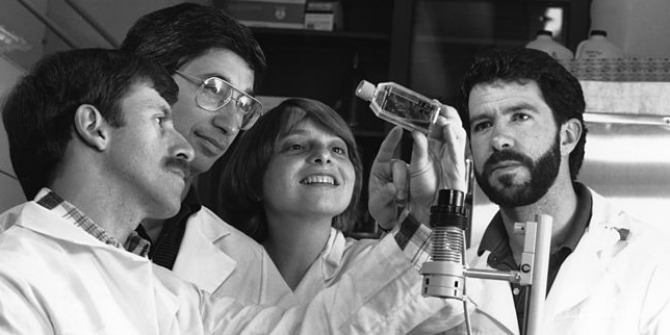
 Policy-making and effective municipal intervention are embedded in a complex web of interrelationships. Joseph A. Curtatone and Mark Esposito write on how decisions in one realm have ripple effects in others. Systems-thinking looks to apply a more holistic way of addressing real-world problems. Harvard students and the city of Somerville, Massachusetts are partnering to tackle problems using a systems-focused approach.
Policy-making and effective municipal intervention are embedded in a complex web of interrelationships. Joseph A. Curtatone and Mark Esposito write on how decisions in one realm have ripple effects in others. Systems-thinking looks to apply a more holistic way of addressing real-world problems. Harvard students and the city of Somerville, Massachusetts are partnering to tackle problems using a systems-focused approach.
For public officials, the law of unintended consequences should need no introduction. It would be hard to find a better example of that law at work than in what happened to Somerville, Massachusetts, after Interstate 93 and the McGrath Highway’s McCarthy Overpass were built through the heart of the Boston suburb decades ago.
The linear, engineering-based logic was simple: Highways free of traffic lights would eliminate traffic congestion for drivers heading in and out of Boston. But the impact on Somerville was complex, and the ensuing ripple effects were dynamic. Neighborhoods were cut off from one another. Numerous rail and trolley stops were eliminated. Economic development stymied. Air pollution led to higher rates of heart disease, asthma and other ailments among people living in the shadows of the highways. Somerville became less walkable and bikeable, contributing to rising childhood obesity rates.
That the construction of I-93 and the overpass might lead to more childhood obesity seems obvious in hindsight. People know that an event or decision in one realm can cause ripple effects in other realms — it’s intuitive. Yet in creating public policy, we frequently fail to think in terms of interrelated systems.
 Image credit: Miami’s Complex Midtown Interchange, circa 1960s Public Domain
Image credit: Miami’s Complex Midtown Interchange, circa 1960s Public Domain
In Somerville, we’re working to bring this kind of intuitive, systems-focused thinking into the policy-making process in partnership with an internationally acclaimed systems-thinking course now in its fourth summer at Harvard University and taught by one of the authors of this article. Harvard students are working with staff from the city’s SomerStat Office of Innovation and Analytics, thinking holistically about how, for instance, a policy decision regarding affordable housing might affect education and public health, and vice versa. This class is serving as an ideas incubator for the city’s new NEXUS initiative, which aims to engage city officials and residents alike in thinking about issues facing the community not as isolated threads but as part of an interwoven community fabric.
This isn’t a theoretical exercise. It’s about applying this holistic way of thinking in a practical way to real-world problems. Opioid abuse and overdose, for example, is an urgent and critical issue facing Somerville and other cities, and intuitively we know that there are many factors driving this epidemic. It’s a question that the students are examining this summer with a wide-angle lens, trying to understand how this issue enmeshes with others such as education, housing and social cohesion within the community.
As for childhood obesity, Somerville has employed systems thinking to tackle that problem as well. The city’s Shape Up Somerville program instituted healthier school food menus and policies focused on getting kids active at school and beyond. Infrastructure, zoning and planning work aim to make the city more walkable and bikeable. Parks, open spaces and community events invite people out. Families have better access to healthier foods through Shape Up-approved restaurants as well as farmers’ markets and a year-round mobile market where people can use their SNAP and WIC benefits. And the city’s urban-agriculture ordinance makes it easier to grow fresh, healthy foods at home. By attacking the problem of childhood obesity holistically, Somerville created a model that has achieved real, measurable results: fewer Somerville children were obese or overweight after two full years of the intervention. Shape Up Somerville was cited by first lady Michelle Obama’s “Let’s Move” program.
The impact of the systems-thinking approach can already be felt far beyond Somerville: The Harvard students are getting real-world experience in applying concepts that they’ll be able to take into their respective fields and careers. Many of the students come from business backgrounds, a realm where systems thinking has been in use for decades. The Harvard course was selected in 2013 by European Parliament President Martin Schulz as an incubator for ideas for dealing with the European Union’s financial crisis.
We live in the era of Big Data. But while number-tracking and crunching have deepened our understanding of issues, data analytics is mostly aimed at figuring out linear relationships. The other piece of the puzzle is discerning complex webs of interrelationships — the broader, more holistic approach to policy-making that we need to tackle problems that are rarely linear.
This article first appeared at Governing.
Note: This article gives the views of the author, and not the position of the Impact of Social Science blog, nor of the London School of Economics. Please review our Comments Policy if you have any concerns on posting a comment below.
Joseph A. Curtatone is Mayor of Somerville, Massachusetes
Mark Esposito is an Associate Professor of Business & Economics at Grenoble Graduate School of Business in France, an Instructor at Harvard Extension School, and a Senior Associate at the University of Cambridge-CPSL in the UK. He serves as Institutes Council Co-Leader, at the Microeconomics of Competitiveness program (MOC) at the Institute of Strategy and Competitiveness, at Harvard Business School. He is also the Founding Director of the Lab-Center for Competitiveness. His full profile can be found at www.mark-esposito.com and he tweets as @Exp_Mark








1 Comments